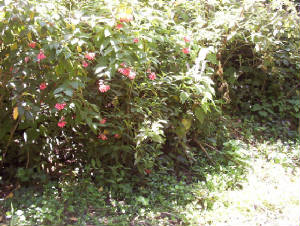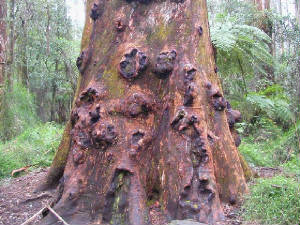|
Think Globally, Act Locally...
You can make a start by volunteering some of your time
WHO ARE WE TO TALK

The Friends Of The Trestle Bridge sprung from the Friends of Sherbrooke Forest's Tuesday Mob turning their attention to the
newly annexed area of Sherbrooke Forest National Park around the Selby Puffing Billy trestle bridge.
After removing weeds (particularly Cestrum elegans which had assumed thicket proportions) from the area upstream from
the bridge, the task of dealing with re-emergent weeds and rehabiltating the rest of the trestle bridge gully was seen to
merit a separate, dedicated Friends group.
We're a small wheel in a larger machine. We are part of a growing, and very welcome, co-ordination of Melbourne Water, Parks
Victoria and the Emerald Tourist Railway Board, Yarra Ranges Shire Council, Friends Of Sherbrooke Forest and other Friends
groups, the Green Corps, local schools and other land management stake-holders, with the long-term aim of making the Monbulk
Creek and it's tributaries a clean-water, healthy habitat for wildlife and all the rest of us, free of environmental weed
infestation, and containing, linking and reflecting the varied plant and creature communities that are native to this creek
catchment.
THE STAKES
Most of the extensive forests that covered these ranges were carted away on bullock drays, indeed, on the little train itself,
or destroyed by wild fires then and since and what still remains or has recovered from this 100 year assault is precious for
many reasons and must be held on to.
Institutional, community and particularly individual involvement can preserve and nurture the sometimes unique indigineous
plant and animal species and communities that still survive along this urban creek with a forest source.
THE CHALLENGE
We at the trestle bridge believe that having a number of the different hills plant communities represented within about 50
acres at a popular tourist attraction, with every one of them under sustained attack by the most pernicious weeds of this
forest means that this site must be a high priority for serious efforts at weed control and forest rehabilitation.
The Friends cannot possibly do this alone and hope to contribute to stimulating co-operation and concerted action on an
appropriate scale by the bodies charged with the management of this ailing and degraded valley consisting of National Park,
railway property and right-of-way and public reserve and private land.
It's an opportunity to apply and demonstrate to others, in one high-profile public site, the many different weed control
strategies and techniques that have been developed and refined over decades by the work of the dedicated park staff and volunteer
weed-workers of Sherbrooke Forest.
COME ON DOWN
We extend an open invitation to any group or individual that would like to be shown around our site. Needless to say, any
respectable organisation wishing to conduct field trials on vigorous invasive environmental weeds in a forest is welcome to
inspect our extensive facility. We can offer a wide variety of weed infestations and forest conditions and you can be assured
that all of our weeds are very fine and healthy specimens indeed.
A Network Of Friends
From the very first group of Friends, that of the Organ Pipes National Park, founded in 1972, there are now 550 in greater
Melbourne alone and a new one seems to get going every week.
The are heartily supported by the government folks from the various environment, heritage and rural agencies who need
all the help they can get.
When we say "They should do something about that..." or "Someone should fix that up", often "they"
is us. The task requires too many hands to expect the public purse to cover everything. Friends don't replace decent official
management, they augment, influence, attract and ultimately improve it. Merely the fact that some ratepayers and taxpayers
care enough to get organised can be beneficial to an area of natural bushland and it's critters.
Think about connecting with a group. If there is a creek or bit of bush near you, chances are there is a Friends group.
If there isn't, call up a few mates and start your own. Get a decent book or two, find out what the weeds look like and what
should be there and give it a burl. Do a course.
All the information you need to get started can be found in our links pages.
The groups and the network represent a way of social connection and service to the local community that many thought was
fading with the decline of traditional service club membership.
So get with the program and get with a network.
The Attractions & Benefits Of Becoming A Volunteer
Social benefits
* Become part of a social network
* Create opportunities for strengthening connections and forming closer ties within a community
* Gain personal satisfaction and sense of pride that comes from doing something worthwhile for the community and the
environment
* The positive feelings associated with making a contribution and doing something, rather than just "talking
about it"
* Meet new people, make new friends and get to know the neighbours
* Grow in self esteem and self confidence
* Participate in healthy, active and enjoyable activities
* Have fun with like-minded people
* Pursue a passion
Environmental benefits
* Enhance the environmental and aesthetic values of the area
* Rehabilitate the area for future generations to enjoy
* Conserve native flora, fauna and remnant vegetation
* Foster community support and stewardship of natural areas
* Encourage active community involvement in the management of natural areas
Educational benefits
* Learn more about environmental problems and proactive solutions
* Learn and build new skills for the conservation of natural and cultural heritage
* Get actively involved and learn new skills for managing natural areas
* Create peer pressure as volunteers go out into the community as advocates and encourage others to also learn and
change their attitudes and behaviour
* Add variety to one's work experience and make contacts with potential employers
* Gain on-the-job experience before committing to further education or a career change
Economic benefits
* Efficiency of work and use of resources - when the volunteer work is coordinated and complements the work of paid
staff and contractors
* The protection of the environment needs the support and involvement of the whole community - 'They' or 'The government'
spending money or making new laws is only part of the answer
The attractions text was copied verbatim from the Volunteer Co-ordinators Network website
| Go to the VCN Site |

|
|



